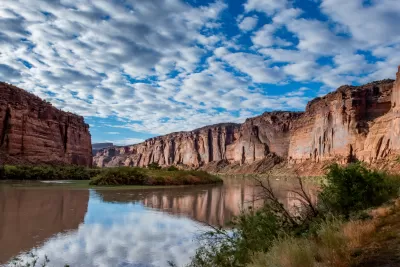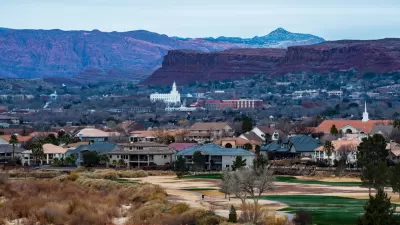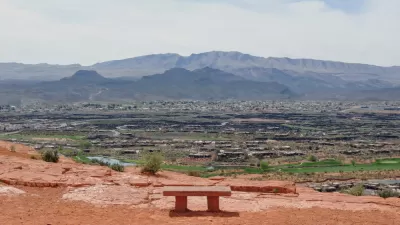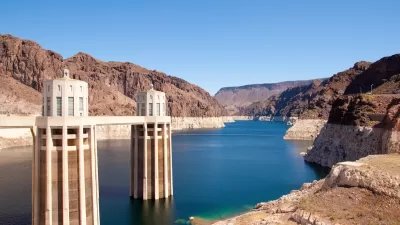After a year of contentious negotiations, Western states dependent on the river’s water supply are nearing a deal that would reduce water use significantly over the next three years.

California, Arizona, and Nevada are close to reaching a deal to protect the Colorado River’s threatened water supply. According to an article by Joshua Partlow in The Washington Post, the Lower Basin states have so far been reluctant to submit feedback on the federal government’s proposed alternatives, claiming they can come to an agreement of their own.
As Partlow explains, “The consensus emerging among these states and the Biden administration aims to conserve about 13 percent of their allocation of river water over the next three years and protect the nation’s largest reservoirs, which provide drinking water and hydropower for tens of millions of people.”
The proposed deal would cut back roughly 3 million acre-feet of water in the next three years in exchange for federal funding from the Inflation Reduction Act. Despite contentious negotiations between California and Arizona, the river’s top users, over the past year, “these states now appear more united than ever and are closing their differences with the federal government, even as significant issues remain unresolved.”
After a historically wet winter, the river’s reservoirs are in less dire condition than they were last year, but officials from Upper Basin states (Colorado, New Mexico, Utah and Wyoming) want to see more binding commitments to conservation from Lower Basin states. Becky Mitchell, Colorado’s representative in the negotiations, insists that the states need to reevaluate their relationship with the river, saying that “the enemy is not any organization, agency or part of the basin.” Rather, “The enemy is the old way.”
More background on the Colorado River crisis:
FULL STORY: States near historic deal to protect Colorado River

Alabama: Trump Terminates Settlements for Black Communities Harmed By Raw Sewage
Trump deemed the landmark civil rights agreement “illegal DEI and environmental justice policy.”

Planetizen Federal Action Tracker
A weekly monitor of how Trump’s orders and actions are impacting planners and planning in America.

Why Should We Subsidize Public Transportation?
Many public transit agencies face financial stress due to rising costs, declining fare revenue, and declining subsidies. Transit advocates must provide a strong business case for increasing public transit funding.

Understanding Road Diets
An explainer from Momentum highlights the advantages of reducing vehicle lanes in favor of more bike, transit, and pedestrian infrastructure.

New California Law Regulates Warehouse Pollution
A new law tightens building and emissions regulations for large distribution warehouses to mitigate air pollution and traffic in surrounding communities.

Phoenix Announces Opening Date for Light Rail Extension
The South Central extension will connect South Phoenix to downtown and other major hubs starting on June 7.
Urban Design for Planners 1: Software Tools
This six-course series explores essential urban design concepts using open source software and equips planners with the tools they need to participate fully in the urban design process.
Planning for Universal Design
Learn the tools for implementing Universal Design in planning regulations.
Caltrans
Smith Gee Studio
Institute for Housing and Urban Development Studies (IHS)
City of Grandview
Harvard GSD Executive Education
Toledo-Lucas County Plan Commissions
Salt Lake City
NYU Wagner Graduate School of Public Service





























